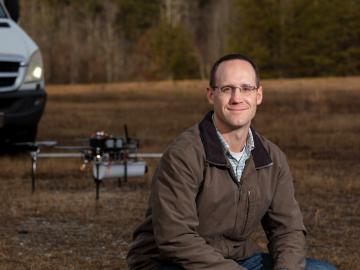
Filter News
Area of Research
- Advanced Manufacturing (1)
- Biology and Environment (18)
- Computational Engineering (1)
- Computer Science (2)
- Energy Science (24)
- Fusion and Fission (2)
- Isotope Development and Production (1)
- Isotopes (8)
- Materials (28)
- Materials for Computing (4)
- National Security (14)
- Neutron Science (8)
- Nuclear Science and Technology (5)
- Quantum information Science (1)
- Sensors and Controls (1)
- Supercomputing (32)
News Type
News Topics
- (-) Bioenergy (29)
- (-) Cybersecurity (18)
- (-) Isotopes (24)
- (-) Microscopy (20)
- (-) Security (12)
- (-) Space Exploration (3)
- (-) Summit (24)
- 3-D Printing/Advanced Manufacturing (59)
- Advanced Reactors (14)
- Artificial Intelligence (46)
- Big Data (17)
- Biology (30)
- Biomedical (21)
- Biotechnology (12)
- Buildings (22)
- Chemical Sciences (44)
- Clean Water (2)
- Composites (14)
- Computer Science (79)
- Coronavirus (17)
- Critical Materials (11)
- Education (3)
- Element Discovery (1)
- Emergency (1)
- Energy Storage (48)
- Environment (51)
- Exascale Computing (23)
- Fossil Energy (1)
- Frontier (24)
- Fusion (19)
- Grid (21)
- High-Performance Computing (46)
- Irradiation (1)
- ITER (3)
- Machine Learning (17)
- Materials (71)
- Materials Science (60)
- Mercury (2)
- Microelectronics (1)
- Molten Salt (3)
- Nanotechnology (32)
- National Security (23)
- Neutron Science (61)
- Nuclear Energy (36)
- Partnerships (34)
- Physics (27)
- Polymers (14)
- Quantum Computing (16)
- Quantum Science (35)
- Simulation (15)
- Software (1)
- Statistics (1)
- Transportation (37)
Media Contacts

Horizon31, LLC has exclusively licensed a novel communication system that allows users to reliably operate unmanned vehicles such as drones from anywhere in the world using only an internet connection.

After its long journey to Mars beginning this summer, NASA’s Perseverance rover will be powered across the planet’s surface in part by plutonium produced at the Department of Energy’s Oak Ridge National Laboratory.

A team led by Dan Jacobson of Oak Ridge National Laboratory used the Summit supercomputer at ORNL to analyze genes from cells in the lung fluid of nine COVID-19 patients compared with 40 control patients.

Five researchers at the Department of Energy’s Oak Ridge National Laboratory have been named ORNL Corporate Fellows in recognition of significant career accomplishments and continued leadership in their scientific fields.

Scientists at ORNL used neutron scattering and supercomputing to better understand how an organic solvent and water work together to break down plant biomass, creating a pathway to significantly improve the production of renewable

A team of researchers has performed the first room-temperature X-ray measurements on the SARS-CoV-2 main protease — the enzyme that enables the virus to reproduce.

Researchers at the Department of Energy’s Oak Ridge National Laboratory have used Summit, the world’s most powerful and smartest supercomputer, to identify 77 small-molecule drug compounds that might warrant further study in the fight

An international team of researchers has discovered the hydrogen atoms in a metal hydride material are much more tightly spaced than had been predicted for decades — a feature that could possibly facilitate superconductivity at or near room temperature and pressure.

A technology developed at the ORNL and scaled up by Vertimass LLC to convert ethanol into fuels suitable for aviation, shipping and other heavy-duty applications can be price-competitive with conventional fuels

The U.S. Department of Energy’s Office of Science announced allocations of supercomputer access to 47 science projects for 2020.


